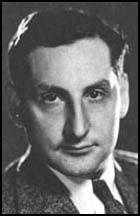John Howard Lawson

John Howard Lawson was born in New York on 25th September, 1894. After studying at Williams College (1910-14) he became a successful writer with plays such as Standards (1916) and Servant-Master-Lover (1916).
When America entered the First World War in 1917 he became an ambulance driver with the Red Cross in Europe. While on the Western Front he became friends with another driver, John Dos Passos.
After the war he edited a newspaper in Rome. Lawson returned to the United States where he began writing plays. Although these often expressed Marxist ideas, some made it to Broadway. Plays performed in New York City included Roger Bloomer (1923), Processional (1925), Loud Speaker (1927) and The International (1927).
In 1928 Lawson moved to Hollywood. A fellow screenwriter, John Bright, later recalled that when he first arrived in the area "there was no left-wing movement at all". Lawson and Bright were two of the original four secret members in the Hollywood section of the Communist Party of the United States (CPUSA).
Lawson lectured to young actors, telling them that their performances had to advance the class struggle. "If you are merely an extra playing a member of a country club, play it in a way that will invite prejudice against the class represented. If you are an extra in a street scene of a tenement district or in any poor surroundings, play your part to excite sympathy."
Lawson wrote scripts for films such as The Ship for Shanghai (1930), Bachelor Apartment (1931) and Goodbye Love (1933). In 1933 Lawson joined forces with Dorothy Parker, Donald Ogden Stewart, Alan Campbell, Lillian Hellman, Dashiell Hammett, Lester Cole, Paul Green, Gordon Kahn, John Bright, Samuel Ornitz, Joseph Mankiewicz, Charles Brackett and Philip Dunne to establish the Screen Writers and Authors Guild and was the organization's first president.
Victor Jerome was the head of the Party's Cultural Commission. For a time, Jerome personally assumed responsibility for the Hollywood branches, "insulating them from the rest of the Party in Los Angeles and keeping them in direct touch with the national leadership". John Howard Lawson ran the Hollywood branch. However, as Victor Navasky, the author of Naming Names (1982) pointed out: "John Howard Lawson, who ran the Hollywood branch, quickly understood that the collective process of movie making precluded the screenwriter, low man on the creative totem pole, from influencing the content of movies."
Lawson managed to make several films that were were political, including Blockade (1938), the Academy Award winning film on the Spanish Civil War and Counter-Attack (1945), a tribute to the Soviet-USA alliance during the Second World War.
After the Second World War the House of Un-American Activities Committee began an investigation into the Hollywood Motion Picture Industry. In September 1947, the HUAC interviewed 41 people who were working in Hollywood. These people attended voluntarily and became known as "friendly witnesses". During their interviews they named several people who they accused of holding left-wing views.
Lawson appeared before the HUAC on 29th October, 1947, but like Alvah Bessie, Herbert Biberman, Albert Maltz, Adrian Scott, Dalton Trumbo, Lester Cole, Edward Dmytryk, Samuel Ornitz and Ring Lardner Jr, he refused to answer any questions. Known as the Hollywood Ten, they claimed that the 1st Amendment of the United States Constitution gave them the right to do this. The House of Un-American Activities Committee and the courts during appeals disagreed and all were found guilty of contempt of Congress and Lawson was sentenced to twelve months in Ashland Federal Correctional Institution and fined $1,000.
Blacklisted by the Hollywood studios, Lawson moved to Mexico where he began writing Marxist interpretation of drama and film-making such as The Hidden Heritage (1950), Film in the Battle of Ideas (1953) and Film: The Creative Process (1964).
John Howard Lawson died in San Francisco on 14th August, 1977.
Primary Sources
(1) Edward Dmytryk, interviewed by the House of Un-American Activities Committee (25th April, 1951)
John Howard Lawson settled all questions. If there was a switch in the Party line, he explained it. If there were any decisions to be made, they went to John Howard Lawson. If there was any conflict within the Communist Party, he was the one who settled it. We had a third meeting at which Adrian Scott brought Albert Maltz, who was a more liberal Communist, to defend us. These meetings ended in a stalemate.
Albert Maltz had been concerned about the lack of freedom of thought in the Communist Party for some time, and this was the trigger for the article he wrote for the New Masses on freedom of thought which was so widely discussed. So he wrote the article which he later had to repudiate or get out of the Party, and he chose to repudiate it.
